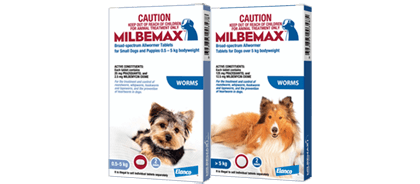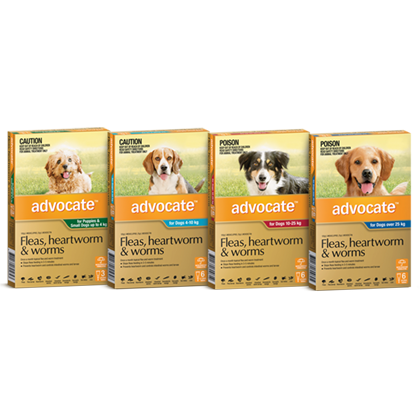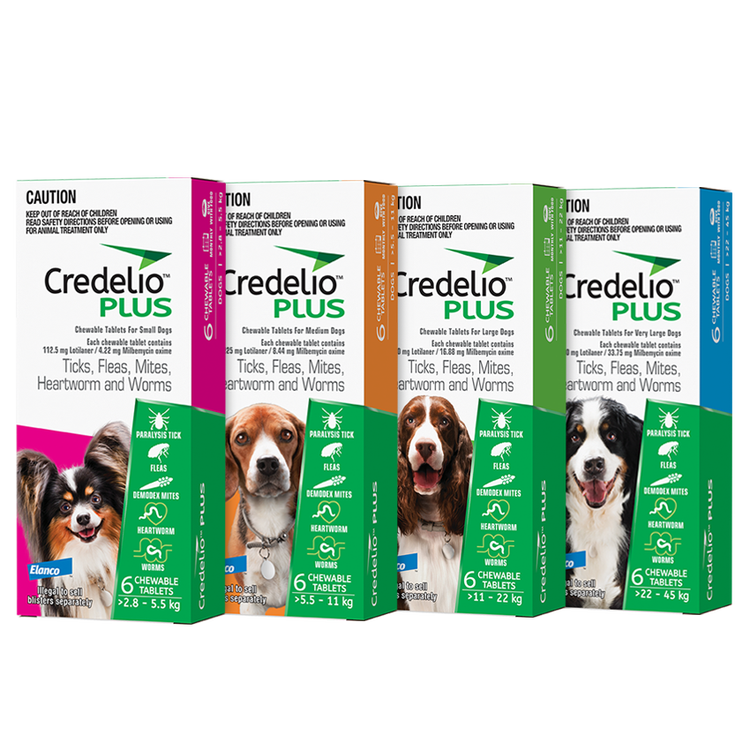Ever wondered about the risks that worms pose to your dog? Here are seven things your veterinarian wants you to know about these intestinal parasites.
Seven things your vet wants you to know about worms in dogs
Although it's not nice to mention, all dogs are exposed to worms, often even before they are born! Not only do they cause health problems for dogs, some worms from dogs can infect you and your family.
So - what do the experts say? Below are seven common questions vets are asked by dog owners about worms.
1. Which intestinal worms should I be worried about?
Roundworms, hookworms, whipworm and tapeworms are the primary culprits in dogs, although this can vary depending on where you live. Here is an overview of these types of worms, including how to recognise them:
Roundworms
Roundworms are quite common and can be a real nuisance for dogs. Picture long, spaghetti-like strands that can grow up to several inches – that's what they look like. These worms may cause tummy troubles like vomiting, diarrhoea, and a swollen belly, especially in young puppies. Severe infections in puppies can even lead to intestinal blockage.

Roundworms in the intestinal tract

Swollen belly in a puppy infected with roundworm

Roundworm egg under a microscope
Hookworms
Hookworms may be small and thin, but they can pack a punch. These little bloodsuckers latch onto the intestinal lining and feed on blood, causing anaemia and weight loss. They can be particularly dangerous for puppies, sometimes even proving fatal if left untreated.

Hookworms in the intestinal tract

Hookworm egg under a microscope
Whipworms
With their unique whip-like shape, whipworms take up residence in the large intestine. These parasites can lead to symptoms like diarrhoea, weight loss, and anaemia. Keep in mind that whipworm infections can be a bit tricky to diagnose, as the worms release their eggs only intermittently.

Whipworm – unique whip-like shape

Whipworm egg under a microscope
Tapeworms
Tapeworms are flat, segmented worms that can range in length from only 5-6 mm all the way up to 70 cm! Dogs usually get infected with tapeworms by swallowing fleas carrying the parasite or by consuming raw or undercooked meat from infected animals. These worms can cause digestive issues, weight loss, and irritation around the bottom.



Flea tapeworm images
2. How do I know if my dog has worms?
If your dog is fully grown, it’s not always obvious when they have worms, so you might not know for sure. Keep an eye out for these common symptoms:
- General symptoms in adult dogs: In adult dogs, signs of worm infections can be hard to spot, as they might be mild or even absent. However, watch for weight loss, tiredness, scooting (dragging their bottom on the ground), and changes in appetite as potential indicators.
- Symptoms in puppies: It's generally easier to notice worm infections in puppies. You might see symptoms like vomiting, diarrhoea, a swollen belly, and a dull coat. Some worms, like hookworms, can cause severe anaemia in puppies, which may require a blood transfusion to treat.
- Gastrointestinal symptoms: Worm infections, particularly those caused by roundworms, hookworms and whipworms, can lead to stomach issues like vomiting, diarrhoea, and abdominal pain.
- Respiratory symptoms: Occasionally in puppies, roundworm & hookworm infections can cause problems, such as coughing, wheezing, and difficulty breathing.
- Skin irritation and itchiness: Certain worm infections, like hookworms, can result in skin irritation and itchiness, especially around the paws.
- Visible worms or segments in faeces: If your dog has tapeworms, you might spot small, rice-like segments of the worm in their faeces or around their bottom.
Regardless of whether a dog is showing symptoms of worms or not, an infected dog will pass eggs in its faeces that can then infect other dogs or even people. Regular deworming is crucial to lower this risk. Your vet will be able to discuss the risks to your dog and your family and advise on a parasite protection plan that’s right for all of you.
3. How did my dog get worms?
This is a common veterinary question. People often feel guilty if their dog has worms, but almost all puppies are born with roundworms, and most will become infected with roundworms or hookworms via their mother’s milk. It is very easy for dogs to be exposed to a range of parasites throughout their lives. Roundworms, hookworms and whipworms, can be contracted if your dog ingests their microscopic eggs or larvae when eating grass, mouthing their toys, or grooming themselves after being outside. Alternatively, they can become infected with roundworms, hookworms and tapeworms if they eat other infected animals, including if they’re fed raw meat or offal. Your vet will be able to tell you more about the specific risks to your pet depending on your pet’s lifestyle and where you live.
4. How often should I deworm my dog?
This is an important question, and will vary according to your dog’s age, health and lifestyle and the treatment you choose. Below are some guidelines on how to protect your dog from worms, but always consult your veterinarian for the best advice for your pet’s specific needs.
Up to 8 weeks of age:
Many puppies are born with worms and acquire more from their mother’s milk, so it’s important to start treating them from 2 weeks of age. MilbemaxTM tablets# are an example of a popular product for deworming dogs, including young puppies, and has been trusted by vets for over 20 years.
#Puppies must be at least 2 weeks of age and weigh 0.5 kg
From 8 weeks of age:
The ideal approach to deworming will vary depending on factors like location, your dog’s health and lifestyle, and the type of treatment you prefer. Options include:
- Continue with Milbemax tablets for protection against all major gastrointestinal worms (refer to label for dosing recommendations)
- Apply AdvocateTM spot-on monthly (from as early as 7 weeks of age) for protection against most gastrointestinal worms, as well as fleas and heartworm
- Give CredelioTM PLUS chewable tablets monthly for protection against most gastrointestinal worms, as well as fleas, ticks, mites and heartworm
Always read and follow label directions.
5. Can I get worms from my dog?
Unfortunately, yes. Roundworms, tapeworms and hookworms can cause problems in people as well as dogs. This is yet another reason why regular deworming is so important – for the health of your family as well as your pets.
Remember: Consult your vet to get more personalised information about your dog’s specific risk of worms. Your vet will factor in your dog’s lifestyle and the region you live in and can recommend a treatment plan tailored to your pet. Your vet will have recommendations for how to help reduce the risk to you and your family. If you suspect your dog has worms, schedule a vet visit to get a diagnosis and the correct treatment.
6. How does my dog’s diet affect their risk of worm infections?
As a dog owner, it's essential to understand that your dog's diet can influence their chances of getting worm infections. A balanced and nutritious diet can help strengthen your dog's immune system, making them less vulnerable to infections. However, specific feeding habits can increase the risk of worm infections. Here are some key factors to be aware of:
- Raw food diets: If you're feeding your dog a raw food diet, be aware that raw meat, particularly organ meats (offal), can carry a higher risk of introducing parasites like tapeworm to your dog. Raw meat may contain eggs or larvae, and your dog can become infected after eating it. To minimise this risk, only buy meat from reliable sources and freeze it for a while before giving it to your dog, as freezing can help kill some parasites.
- Hunting and scavenging: Dogs that are allowed to hunt or scavenge for food are more likely to ingest infected prey or contaminated food, which can result in worm infections like roundworm, hookworm and tapeworm. To prevent this, keep an eye on your dog during outdoor activities and teach them not to eat prey or scavenge for food.
- Contaminated food or water: Your dog can pick up parasites from contaminated food, water, or even shared feeding bowls. Make sure to store your dog's food in a clean, dry place and provide fresh water daily. Don't let your dog drink from standing water sources, such as puddles or ponds, where parasites might be lurking.
- Poor nutrition: A dog that isn't receiving a balanced and nutritious diet may have a weaker immune system, making them more susceptible to worm infections. To keep your dog healthy, provide a complete and balanced diet tailored to their life stage and activity level.
By keeping a close eye on your dog's diet and feeding habits, you can significantly reduce their risk of worm infections.
7. How should I treat worm infections in my dog?
There are two main types of treatment options that your veterinarian may recommend for addressing worm infections in your dog:
- Oral deworming medications: These medications are often the primary treatment for most worm infections. They are available in various forms, such as tablets, liquids, or even chewable treats that may appeal to your dog. These medications function by targeting and eliminating the worms within your dog's system, and can require either a single dose or sometimes multiple doses, depending on the severity of the infection. Milbemax is a popular example of this type of product and has been trusted by Australian Vets for over 20 years. Another option is Credelio PLUS, these chewable tablets are given monthly for protection against most gastrointestinal worms, as well as fleas, ticks, mites and heartworm.
- Topical treatments: Some topical medications such as Advocate are applied directly to your dog's skin. These treatments are absorbed through the skin and into the bloodstream, where they target and kill the worms. Topical treatments can be especially convenient for dogs that are resistant to taking oral medications. Advocate applied monthly offers protection against most gastrointestinal worms, as well as fleas and heartworm.
In conclusion, worms are a common concern for dog owners, but with proper prevention and treatment, you can keep your furry friend healthy and worm-free. Understanding the risks, symptoms, and treatment options for worm infections is crucial for maintaining your dog's health and well-being. By consulting with your veterinarian and following their advice, you can ensure that your dog stays healthy and happy, while also protecting your family from potential health risks. Remember, a well-informed dog owner is a dog's best friend!

Milbemax™ worming tablets for dogs
Milbemax™ tablets for dogs protect against all the most common worms your dog will come into contact with, including tapeworm.

Advocate for dogs
Advocate provides fast relief from fleas, prevents deadly heartworm and helps protect your dog and your family from most intestinal worms

Credelio™ Plus 4 in 1 protection in the smallest chew
Keeps your dog protected from ticks, fleas, demodex mites PLUS heartworm and intestinal worms.






